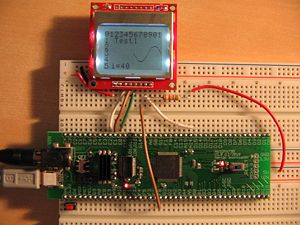Difference between revisions of "NU32v2: Nokia 5110 LCD"
NickMarchuk (talk | contribs) |
|||
| (One intermediate revision by one other user not shown) | |||
| Line 1: | Line 1: | ||
'''THIS PAGE REFERS TO A PRE-RELEASE VERSION OF THE NU32 PIC32 DEVELOPMENT BOARD. FOR INFORMATION, SAMPLE CODE, AND VIDEOS RELATED TO THE PRODUCTION VERSION (2016 AND LATER), AND TO THE CORRESPONDING BOOK "EMBEDDED COMPUTING AND MECHATRONICS WITH THE PIC32 MICROCONTROLLER," VISIT [[NU32|THE NU32 PAGE]].''' |
|||
'''*** UNDER CONSTRUCTION ***''' |
|||
[[Image:nu32v2_nokia5110_example.jpg|thumb|300px|The Sparkfun Nokia 5110 controlled by the NU32v2.|center]] |
[[Image:nu32v2_nokia5110_example.jpg|thumb|300px|The Sparkfun Nokia 5110 controlled by the NU32v2.|center]] |
||
Latest revision as of 05:28, 16 January 2016
THIS PAGE REFERS TO A PRE-RELEASE VERSION OF THE NU32 PIC32 DEVELOPMENT BOARD. FOR INFORMATION, SAMPLE CODE, AND VIDEOS RELATED TO THE PRODUCTION VERSION (2016 AND LATER), AND TO THE CORRESPONDING BOOK "EMBEDDED COMPUTING AND MECHATRONICS WITH THE PIC32 MICROCONTROLLER," VISIT THE NU32 PAGE.
The Nokia 5110 from Sparkfun is a 84 x 48 pixel monochrome LCD and breakout board. It is controlled using SPI communication and several digital outputs.
Overview
An LCD is a convenient tool for communication data using text. The Nokia 5110 provides 6 rows of 12 characters of text, or can be used to draw in a 84 x 48 pixel space. The contrast is digitally controlled and 4 white LEDs behind the LCD provide a backlight.
The LCD requires five communication pins from a microcontroller: SPI CLK and SDO, and three digital outputs. The LCD is powered with 3.3V.
Details
Example schematic when communicating with the NU32v2:
- LCD 1-Vcc -----> NU32v2 3.3V
- LCD 2-GND -----> NU32v2 GND
- LCD 3-SCE -----> NU32v2 E2
- LCD 4-RST -----> NU32v2 E1
- LCD 5-D/C -----> NU32v2 E0
- LCD 6-DNK(MOSI) -----> NU32v2 F8 (SDO3)
- LCD 7-SCLK -----> NU32v2 D15 (SCK3)
- LCD 8-LED -----> 330 ohm -----> 5V
- Note: hooking up 8-LED is only required if you want to use the backlight
Library Functions
Code: Nokia5110.h, Nokia5110.c
Full example: All example code
Nokia5110.h sets up control pins on E0, E1 and E2. These may be changed if desired. The file also contains function prototypes, constants, and a 96 x 5 element lookup array of ASCII characters.
Nokia5110.c contains the following functions:
- LcdCharacter - used to write an individual ASCII character
- LcdClear - clears the entire LCD
- LcdInitialize - Initializes SPI3 (can be changed if desired) and sends the startup commands to the LCD
- The second command sent (LCD Vop) sets the contrast of the LCD and can be altered for more or less contrast
- LcdString - writes a string of characters to the LCD
- LcdWrite - sends individual commands to the LCD
- Sending commands before the LCD is ready for them will make the LCD miss them, so 1000 Nop()s are called between commands
- gotoXY - places the cursor at an x pixel (0-84) and y character (0-5)
- setPixel - turns on a pixel at x (0-84) and y (0-48)
Sample Code
Initialize and clear the LCD:
LcdInitialize();
LcdClear();
Go to the leftmost side of the screen on the second line and write 'Hello'
gotoXY(0,1);
LcdString("Hello");
Write the value of a variable:
char str[5];
sprintf(str, "i=%d", i);
LcdString(str);
Turn on a pixel at (20,35):
setPixel(20,35,1);
More Information
The sample code in All example code will create the image at the top of this page. Sending the NU32v2 an 'a' over serial will clear the LCD.
